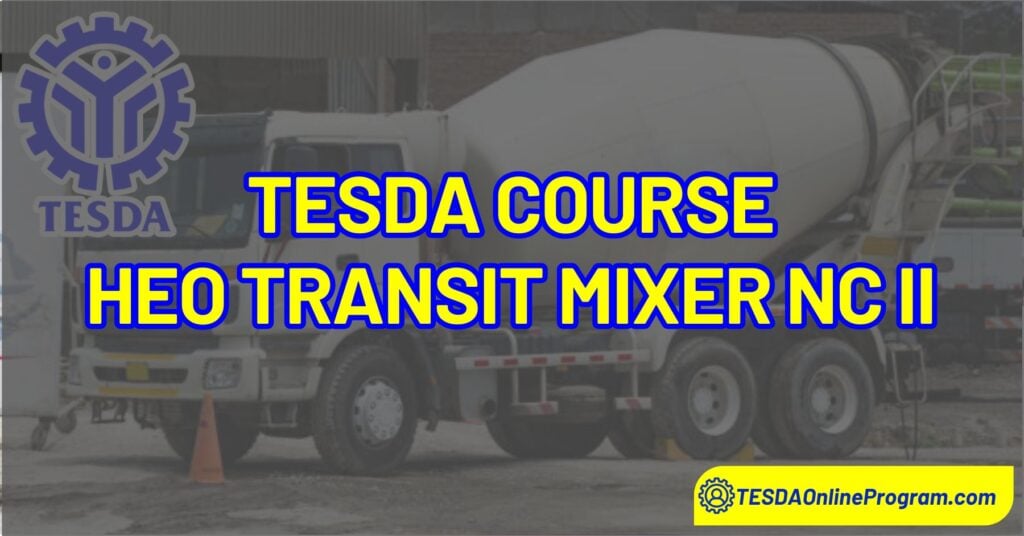The Heavy Equipment Operation (Transit Mixer) NC II course offered by TESDA is designed to equip individuals with the skills required to operate a transit mixer effectively. This qualification focuses on the essential competencies needed to safely and efficiently load ready-mixed concrete from a batching plant, transport it to construction sites, and discharge it as required.
Also read: TESDA HEO – Rough Terrain Crane Courses
This course is ideal for those looking to build a career in the construction industry, specifically in heavy equipment operation. With proper training and certification, workers can ensure the smooth flow of concrete delivery, a critical element in construction projects, while adhering to safety standards and best practices.

Course Description
This course provides individuals with the essential skills and knowledge needed for heavy equipment operation in the construction sector.
Benefits
- Enhanced Job Opportunities: Gain the skills needed to operate a transit mixer, opening doors to employment in the construction and heavy equipment industries.
- Industry-Recognized Certification: Earn a TESDA NC II qualification, boosting your credibility and competitiveness in the job market.
- Specialized Skills Training: Learn how to load, transport, and discharge ready-mixed concrete safely and efficiently.
- Hands-On Experience: Build practical experience in heavy equipment operation, preparing you for real-world tasks on construction sites.
- Career Growth: Develop a specialized skill set, paving the way for advanced roles or higher-paying opportunities in the construction sector.
- Safety Knowledge: Learn essential safety practices specific to heavy equipment operation, ensuring a safer work environment.
- Contribution to Infrastructure Development: Play a vital role in projects that contribute to community and national growth.
Units of Competency
This qualification consists of a range of competency units, which are as follows:
BASIC COMPETENCIES
- Participate in workplace communication
- Work in a team environment
- Practice career professionalism
- Practice occupational health and safety procedures
COMMON COMPETENCIES
- Prepare construction materials and tools
- Observe procedures, specifications and manuals of instruction
- Interpret technical drawings and plans
- Perform mensuration and calculations
- Maintain tools and equipment
CORE COMPETENCIES
- Perform pre- and post-operation procedures for concreting and asphalting equipment
- Perform basic preventive maintenance servicing for concreting and asphalting equipment
- Perform productive operation for transit mixer
Sample of Certificate of Completion

Career Opportunity
An individual with this Qualification is competent to take on the role of a:
- Transit Mixer Operator
Training Duration
- Basic: 18 hours
- Common: 24 hours
- Core: 80 hours
Total: 122 hours
Also read: TESDA HEO – Crawler Crane Courses
Qualifications
This section outlines trainee qualifications and educational experience. It also includes health and physical requirements.
- Holds a Professional Driver’s License
- Capable of basic mathematical computation.
- Proficient in oral and written communication (English or Tagalog)
- Physically and mentally fit
Requirements
To enroll in this course, you will need the following documents:
- PSA Birth Certificate
- High School or College Diploma
- Certified True Copy of Official Transcript of Records or Form 137
- Certificate of Good Moral Character or GMRC
- 1 x 1 and/or 2 x 2 pictures
To obtain further details, please reach out to the enrollment site that aligns with your requirements. Kindly note that the criteria may vary.
Instructor Credentials
The trainer qualifications for this Heavy Equipment Operation (Transit Mixer) NC II require the following:
- Holder of Heavy Equipment Operation (Transit Mixer) NC II
- Completed Training Methodology III (TM III) or equivalent
- Civil service eligible (for government positions only) – Only when mandated by the hiring organization.
- Minimum 5 years of job/industry experience
- Physically and mentally fit
These requirements ensure that the instructor is fully prepared to teach and guide students in the field of Heavy Equipment Operation (Transit Mixer) NC II.
Summary
TESDA offers the Heavy Equipment Operation (Transit Mixer) NC II program, which equips workers with the necessary knowledge and skills to handle heavy machinery effectively. The course covers operating transit mixers, safety protocols, maintenance practices, and industry standards. With TESDA certification, individuals gain a competitive advantage in the job market. The program emphasizes essential skills, safety awareness, efficient equipment operation, and teamwork. Practical hands-on experience and a range of competency units are included in the training. Overall, the course aims to enhance productivity and contribute to the growth of the construction industry.
Contact Information
Technical Education and Skills Development Authority (TESDA)
Office Address: BLDG 8, TESDA Gate 2, TESDA Complex, East Service Rd., South Superhighway, Taguig, Metro Manila.
Email Address: contactcenter@tesda.gov.ph
Telephone Number: 8887-7777
SMS Hotline: 0917-479-4370 (text only)
Website: https://www.tesda.gov.ph/
Facebook Page: https://www.facebook.com/TESDAOfficial



